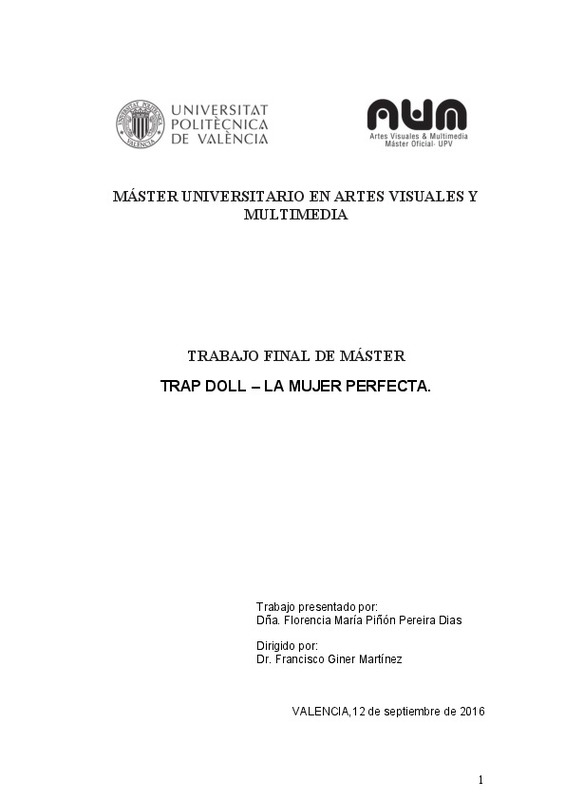JavaScript is disabled for your browser. Some features of this site may not work without it.
Buscar en RiuNet
Listar
Mi cuenta
Estadísticas
Ayuda RiuNet
Admin. UPV
Trap Doll - La mujer perfecta
Mostrar el registro sencillo del ítem
Ficheros en el ítem
| dc.contributor.advisor | Giner Martínez, Francisco
|
es_ES |
| dc.contributor.author | Piñón Pereira Dias, Florencia María
|
es_ES |
| dc.date.accessioned | 2017-01-16T08:19:03Z | |
| dc.date.available | 2017-01-16T08:19:03Z | |
| dc.date.created | 2016-09-28 | |
| dc.date.issued | 2017-01-16 | es_ES |
| dc.identifier.uri | http://hdl.handle.net/10251/76815 | |
| dc.description.abstract | This Master of Art (MA) thesis is a theoretical and practical artistic work with a Ball Jointed Doll (BJD), sculpted by computer and used as a model for a series of photographs that criticize the fact that the mass media and in particular the periodic printing industry, impose an unrealistic ideal of the perfect woman to be followed, with the focus on the covers of "women" magazines. The doll is sculpted using the Blender software and printed with PLA using a 3D printer. The BJD is based on the articulated dolls of the 19th century that were used as a toy with an educational component: to show girls how they should behave and dressing in every social occasion. So with this "educational" and critical tone, the doll will appear in photographs, illustrating how the magazines say a woman should behave to be the ¿perfect woman¿.This work is based on the original theory of Simone de Beauvoir, which is still valid today and it is the basis of many current feminist theories. From Beauvoir¿s idea that the "female" is a historical and social construction, the thesis has the intention to provoke reflection on the observer starting on the fact the doll as a toy, has a very strong symbolism and therefore an important role in the formation of the social identity of women. The work aims to analyze all the practical and technical screening process, modeling and printing of an articulated doll, so that other people can use this work as a guide for their own researches; and deepen down theoretical reflections on the subject, which can serve as reference for future work on the construction of femininity, the Dolls symbology and manipulation of gender roles. | es_ES |
| dc.description.abstract | Este TFM es un trabajo artístico teórico-práctico realizado con muñecas BJD (Ball Jointed Doll), modeladas por ordenador y utilizadas como modelos de una serie de fotografías que critican el hecho de que los medios de masas y en concreto la industria gráfica periódica, imponen un ideal irreal estereotipado de la Mujer Perfecta, que debe ser seguido por las mujeres, con el foco en las portadas de revistas ¿femeninas¿. Esta muñeca está modelada usando el software Blender y se ha impreso en PLA con una impresora 3D, esta basada en las muñecas articuladas del siglo 19 que eran en su época usadas como objetos lúdicos con un componente educativo, para mostrar a las niñas como deberían portarse y vestirse en cada ocasión social. Así, con ese tono educativo, y en clave de crítica, nuestra muñeca va a aparecer en fotografías, ilustrando como las revistas dicen que una debería portarse para ser la mujer perfecta. Partiendo de la teoría original de Simone de Beauvoir, a la que damos todavía vigencia, pues es la base de gran parte de las teorías actuales, de que el ¿femenino¿ es una construcción histórico-social, pretendemos provocar una reflexión sobre el hecho de que la muñeca como objeto de juego, tiene una simbología muy fuerte y por eso un papel relevante en la formación de la identidad social de las mujeres. El trabajo tiene como objetivos, desglosar todo el proceso práctico y técnico de proyección, modelado e impresión de una muñeca articulada, para que otras personas puedan utilizar este trabajo como una guía para sus intereses al respecto; y ahondar en la reflexión teórica sobre el tema, que pueda servir como referencia a futuros trabajos sobre la construcción del femenino, simbolismos de las muñecas y la manipulación de los roles de género. | es_ES |
| dc.language | Español | es_ES |
| dc.publisher | Universitat Politècnica de València | es_ES |
| dc.rights | Reconocimiento - No comercial (by-nc) | es_ES |
| dc.subject | Ball Jointed Doll; 3D Modeling | es_ES |
| dc.subject | Gender role | es_ES |
| dc.subject | Muñeca Articulada roles de genero Modelado 3D | es_ES |
| dc.subject.classification | PINTURA | es_ES |
| dc.subject.other | Máster Universitario en Artes Visuales y Multimedia-Màster Universitari en Arts Visuals i Multimèdia | es_ES |
| dc.title | Trap Doll - La mujer perfecta | es_ES |
| dc.type | Tesis de máster | es_ES |
| dc.rights.accessRights | Abierto | es_ES |
| dc.contributor.affiliation | Universitat Politècnica de València. Departamento de Pintura - Departament de Pintura | es_ES |
| dc.description.bibliographicCitation | Piñón Pereira Dias, FM. (2016). Trap Doll - La mujer perfecta. http://hdl.handle.net/10251/76815 | es_ES |
| dc.description.accrualMethod | TFGM | es_ES |
| dc.relation.pasarela | TFGM\47604 | es_ES |






